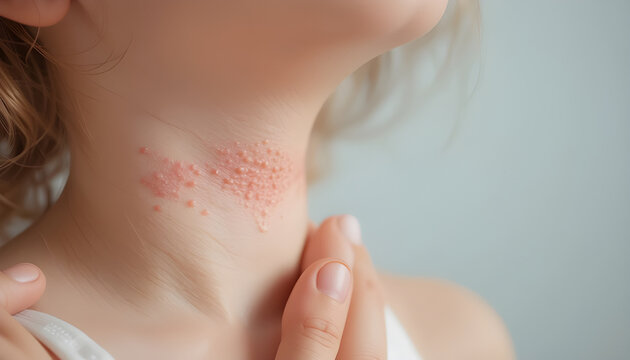Herpes Zoster (Shingles) Treatment
Fast Relief, Fewer Complications
What Is Herpes Zoster (Shingles)?
Herpes Zoster, commonly known as Shingles, is a viral skin condition caused by the reactivation of the varicella-zoster virus — the same virus that causes chickenpox. It typically presents as a painful, blistering rash that appears on one side of the body or face, often in a band-like pattern.
At Dermosphere Clinic, we provide prompt and effective treatment for herpes zoster to reduce pain, prevent complications, and speed up healing — especially important for older adults, diabetics, or immunocompromised individuals.

Signs and Symptoms of Herpes Zoster
• Burning, tingling, or stabbing pain (often before rash appears)
• Red patches and fluid-filled blisters in a band-like distribution
• Rash limited to one side of the body, face, or scalp
• Fever, body ache, and fatigue in some cases
• Crusting and scabbing of blisters in 7–10 days
• Postherpetic neuralgia – long-lasting nerve pain (in some patients)
Who Is at Risk for Shingles?
• Adults over age 50
• Individuals with low immunity (diabetes, cancer, HIV, stress)
• People with a history of chickenpox
• Patients undergoing chemotherapy or steroids
• Unvaccinated individuals
Herpes Zoster Treatment at Dermosphere Clinic
1. Oral Antiviral Medications
• Acyclovir, Valacyclovir, or Famciclovir
• Start within 72 hours of rash onset for best results
• Reduces duration, severity, and risk of nerve pain
2. Pain Relief & Anti-Inflammatory Therapy
• Painkillers, anti-inflammatory drugs, or nerve stabilizers
• Topical soothing creams or cool compresses
3. Management of Blisters
• Keep area clean and dry
• Apply antiviral or antibacterial creams as prescribed
• Prevent secondary infections
4. Treatment for Postherpetic Neuralgia (PHN)
• Gabapentin, pregabalin, or antidepressants for nerve pain
• Early antiviral therapy reduces PHN risk
5. Preventive Advice and Vaccination
• Zoster vaccine recommended for individuals above 50
• Helps prevent future episodes or reduce severity
Why Choose Dermosphere Clinic for Herpes Zoster?
• Dermatologists experienced in infectious and nerve-related skin diseases
• Early diagnosis and evidence-based antiviral care
• Support for immunocompromised and elderly patients
• Safe, sterile management of blisters and nerve pain
• Guidance on vaccination, skin hygiene, and recovery
Frequently Asked Questions
1. Is shingles contagious?
Yes, but not directly as shingles. The virus can spread to someone who’s never had chickenpox or the vaccine, causing chickenpox — not shingles.
2. How long does herpes zoster last?
The rash typically lasts 7–10 days, while nerve pain can persist for weeks to months without treatment.
3. Can I get shingles more than once?
Yes, although rare, shingles can recur in some individuals.
4. Should I be vaccinated after recovery?
Yes. Vaccination reduces recurrence and severity, especially in adults over 50.
Post-Treatment Care
• Avoid scratching or bursting blisters
• Wear loose, cotton clothing
• Maintain good immunity, nutrition, and hydration
• Continue prescribed medication even after rash fades
• Monitor for nerve pain and report early

